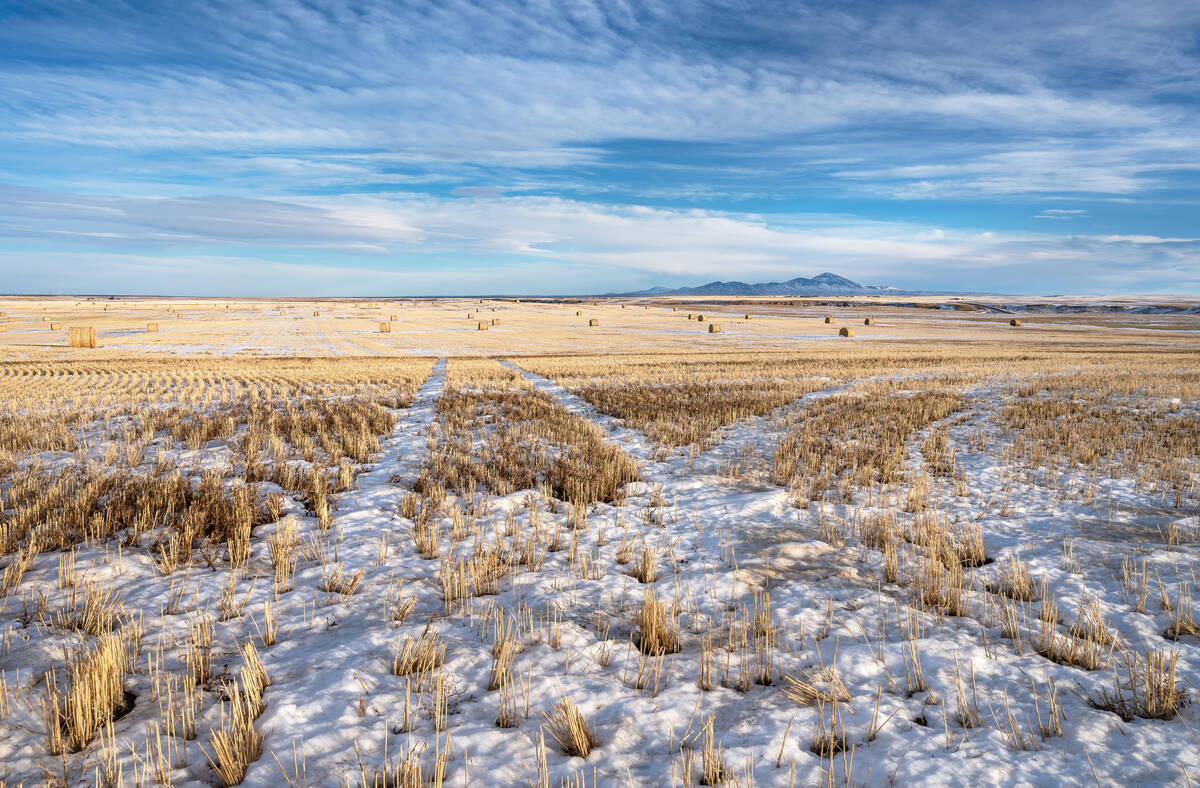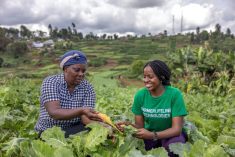The Canadian Federation of Agriculture (CFA) says it is “pleased” the 2021 federal budget included some of the recommendations it had made.
Finance Minister Chrystia Freeland’s first budget, released April 19, included significant spending to help producers transition to a greener economy and cited agriculture as a foundational pillar of Canada’s future.
“CFA will be working closely with the federal government to ensure that these words are followed with impactful actions that truly leverage the potential in our sector,” said CFA president Mary Robinson in a statement.
Read Also

Prairie forecast: Above-average temperatures across Prairies
The Feb. 4 to 11 forecast looks mostly warm across Saskatchewan, Alberta and Manitoba with chances of light precipitation in Manitoba.
Six investments in particular were highlighted by CFA as items in line with the pre-budget recommendations made by Canada’s largest general farm group.
A $1 billion commitment to rapidly roll out broadband projects, and additional money to assist farmers combat COVID-19 and climate change were included on that list, and in budget 2021.
CFA said it would have liked to see “targeted investments addressing the sector’s continued labour needs and leverage domestic market opportunities” but welcomed $1.9 billion in spending over four years to improve Canada’s trade corridors.
“Agriculture has the ability to become a natural climate solution with the continued adoption of technologies and techniques that improve carbon sequestration and capture” with the proper investments and infrastructure, Robinson said.
Bob Lowe, president of the Canadian Cattlemen’s Association, said the group sees the budget as “a starting place for economic recovery discussions. With enabling supports and strategic investments, the agri-food sector has the potential to come out of the pandemic stronger than ever and help Canada in its fight against climate change.”
The CCA said the beef cattle sector is already leading sustainability initiatives through its 2030 goals and “look(s) forward to being a partner of the government as policies and programs are developed.”
Farmers and ranchers to be part of these discussions, the CCA said, “to ensure there are not unintended consequences for the environment, such as grassland loss.
“We note the budget included land conservation efforts and it is important that grasslands, that are such a vital part of the working landscape, are included in these policies, particularly as other government policies may lead to the unintended consequence of further grassland conversion.”
Farmers For Climate Solutions offered up one of the most comprehensive pre-budget submissions to the federal government, and is claiming a win in budget 2021. Like the CFA, several of its pre-budget recommendations were directly addressed by Freeland.
A $200 million in new funding over two years to help producers reduce emissions through nitrogen management, cover cropping and rotational grazing scored high marks with the organization. So too did the $60 million set aside to protect wetlands and trees over the next two years.
As its name suggests, Farmers For Climate Solutions has focused its lobbying efforts on green investments for the sector as Canada aims to achieve its Paris Agreement targets by 2030.
Ian McCreary, a Saskatchewan grain and livestock farmer who helped develop the organization’s budget recommendations, said Canada’s customers want sustainably grown food.
“This investment will support farmers across the country to scale-up practices that are proven to reduce our sector’s emissions,” he said, “Climate change poses the single largest threat to our sector, and this investment is an imperative for our ongoing success.”
‘Points’
Agriculture Minister Marie-Claude Bibeau gave credit to the producers who continue to work to reduce emissions on their farms.
“More and more, farmers are the first ones to witness climate change,” she said, adding they are also the first ones that have to deal with changing weather.
“We have to make a much more significant shift.”
Leading up to the budget, the Liberals telegraphed several intentions and welcomed consultations.
While some groups were happy to see the government pay attention to consultations, not all stakeholders were congratulating the federal government for the 2021 budget.
The Western Canadian Wheat Growers Association (WCWG), for one, said it saw little that will benefit grain farmers in the budget and accused the government of failing to consult with the industry before announcing plans to limit nitrogen fertilizer use.
Its previously released climate plan noted direct emissions from synthetic nitrogen fertilizer applications had increased 60 per cent since 2005 and are projected to continue rising.
That plan committed to setting a “national emission reduction target of 30 per cent below 2020 levels from fertilizers and work with fertilizer manufacturers, farmers, provinces and territories, to develop an approach to meet it.”
A $50 million commitment to help retrofit grain dryers to be more environmentally friendly, as part of a $165.7 million investment, was also included in the budget.
“It is staggering to think that the federal government wants grain farmers to adopt commercially available clean technology by moving off diesel and assist with the purchase of more efficient grain dryers – this is an odd proposal and suggests that the farmers don’t already adopt the newest innovations that have proven benefits… which couldn’t be further from the truth,” Margaret Hansen, Saskatchewan’s director for the WCWG, said in a statement.
Despite Hansen’s assertion all farmers are already adopting commercially available clean technology, the federal government plans to help cover the cost of retrofitting about 1,400 grain dryers to be more environmentally friendly.
Asked about a lack of consultation, Bibeau pointed out she regularly ranks among the most lobbied federal politicians.
“I feel that’s all my life,” she said. “I spend my life on Zoom (with stakeholders).”
She said actions taken in this budget, and action items proposed ahead of it, were measured by their contributions to reaching Canada’s climate goals.
“The proposals that were bringing the best results in terms of reducing emissions would gain more points when it came to the final decision,” she said.
Grain Farmers of Ontario, meanwhile, said it “applauds” the government’s budget pledge to return a portion of the proceeds from carbon pricing directly to farmers.
GFO chair Brendan Byrne said the budget “recognizes that many farmers rely on natural gas and propane in their operations and that there are no ready substitutes.”
GFO was among several farm groups calling on Ottawa to exempt fuels used for grain drying from the pollution pricing system. Byrne said the group will “continue to call on the government to similarly rebate funds collected to date, and to ensure that rebates are delivered in a way that is equitable and administratively simple.”
The Canadian Horticulture Council (CHC) said it was “disappointed” in agriculture funding seen in the budget, “as it fails to adequately recognize our sector’s important role in a post-pandemic economic recovery.”
Jan VanderHout, CHC’s president and a vegetable grower in Ontario, said in a statement “we had hoped to receive more support from the federal budget.”
Horticulture producers had called for the creation of a financial protection mechanism for fruit and vegetable growers, pitching it as a no-cost solution for government that would save farm businesses.
“As Canadians continue to deal with the economic impacts of COVID-19, ensuring a stable and secure supply of fresh food remains critical,” said Rebecca Lee, CHC’s executive director.
“A greater consideration for cost certainty, through financial protection and stable business risk management programming, would go a long way to equipping our fruit and vegetable growers with the tools to survive and thrive.”
— D.C. Fraser reports for Glacier FarmMedia from Ottawa.















